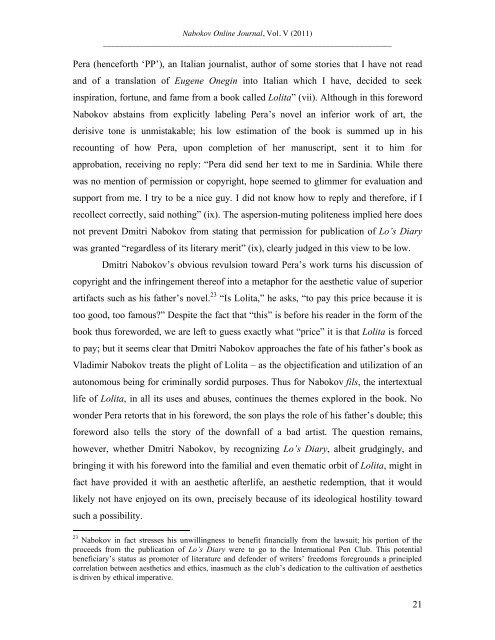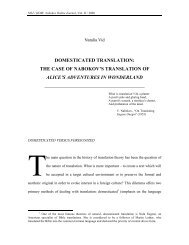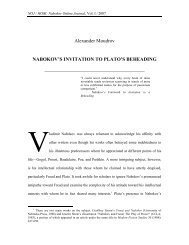You also want an ePaper? Increase the reach of your titles
YUMPU automatically turns print PDFs into web optimized ePapers that Google loves.
Nabokov Online Journal, Vol. V (2011)<br />
_______________________________________________________________________<br />
Pera (henceforth ‘PP’), an Italian journalist, author of some stories that I have not read<br />
and of a translation of Eugene Onegin into Italian which I have, decided to seek<br />
inspiration, fortune, and fame from a book called Lolita” (vii). Although in this foreword<br />
Nabokov abstains from explicitly labeling Pera’s novel an inferior work of art, the<br />
derisive tone is unmistakable; his low estimation of the book is summed up in his<br />
recounting of how Pera, upon completion of her manuscript, sent it to him for<br />
approbation, receiving no reply: “Pera did send her text to me in Sardinia. While there<br />
was no mention of permission or copyright, hope seemed to glimmer for evaluation and<br />
support from me. I try to be a nice guy. I did not know how to reply and therefore, if I<br />
recollect correctly, said nothing” (ix). The aspersion-muting politeness implied here does<br />
not prevent Dmitri Nabokov from stating that permission for publication of Lo’s Diary<br />
was granted “regardless of its literary merit” (ix), clearly judged in this view to be low.<br />
Dmitri Nabokov’s obvious revulsion toward Pera’s work turns his discussion of<br />
copyright and the infringement thereof into a metaphor for the aesthetic value of superior<br />
artifacts such as his father’s novel. 23 “Is Lolita,” he asks, “to pay this price because it is<br />
too good, too famous?” Despite the fact that “this” is before his reader in the form of the<br />
book thus foreworded, we are left to guess exactly what “price” it is that Lolita is forced<br />
to pay; but it seems clear that Dmitri Nabokov approaches the fate of his father’s book as<br />
Vladimir Nabokov treats the plight of Lolita – as the objectification and utilization of an<br />
autonomous being for criminally sordid purposes. Thus for Nabokov fils, the intertextual<br />
life of Lolita, in all its uses and abuses, continues the themes explored in the book. No<br />
wonder Pera retorts that in his foreword, the son plays the role of his father’s double; this<br />
foreword also tells the story of the downfall of a bad artist. The question remains,<br />
however, whether Dmitri Nabokov, by recognizing Lo’s Diary, albeit grudgingly, and<br />
bringing it with his foreword into the familial and even thematic orbit of Lolita, might in<br />
fact have provided it with an aesthetic afterlife, an aesthetic redemption, that it would<br />
likely not have enjoyed on its own, precisely because of its ideological hostility toward<br />
such a possibility.<br />
23 Nabokov in fact stresses his unwillingness to benefit financially from the lawsuit; his portion of the<br />
proceeds from the publication of Lo’s Diary were to go to the International Pen Club. This potential<br />
beneficiary’s status as promoter of literature and defender of writers’ freedoms foregrounds a principled<br />
correlation between aesthetics and ethics, inasmuch as the club’s dedication to the cultivation of aesthetics<br />
is driven by ethical imperative.<br />
21

















